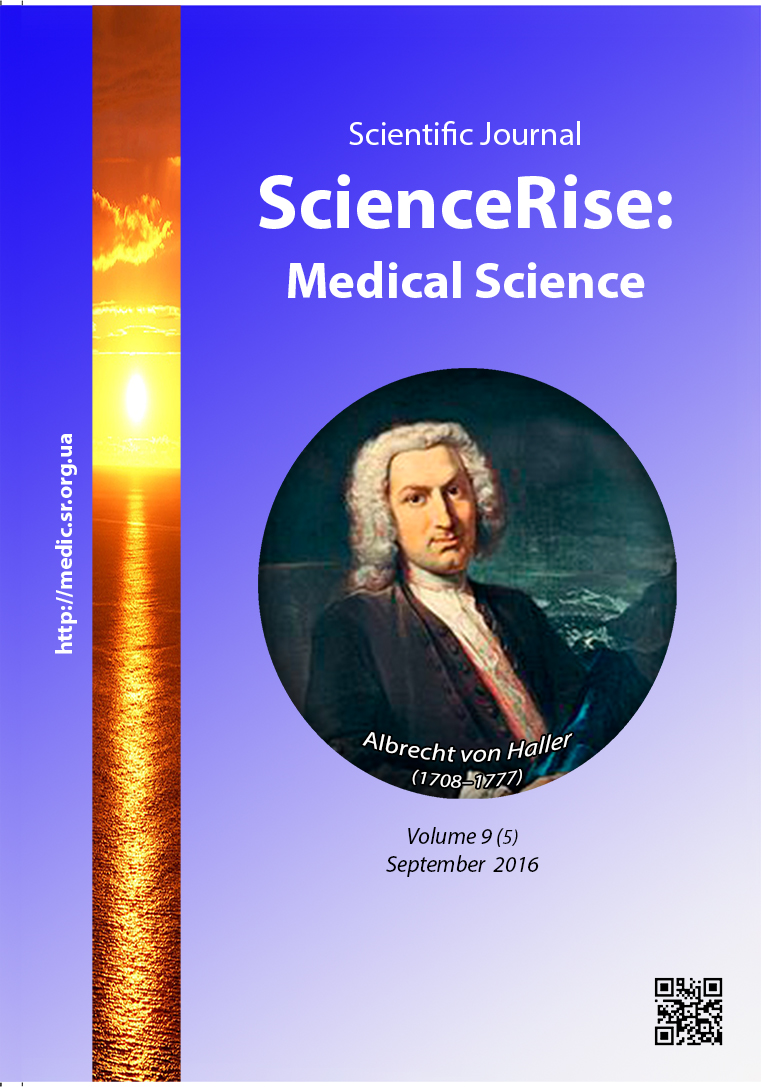Cognitive disturbances at psychical disorders at patients with hypertensive encephalopathy: efficacy of treatment and rehabilitation measures
DOI:
https://doi.org/10.15587/2519-4798.2016.77882Keywords:
hypertensive encephalopathy, cognitive disorders, reproduction of speech constructs, psychic disorders, rehabilitationAbstract
Aim – to determine the clinical-psychopathological risk factors of the early development of psychical disorders in patients with hypertensive encephalopathy.
Methods: informational-analytical, clinical-anamnestic, clinical-neurological, psycho-diagnostic, statistical.
Results. It was established, that psychic disorders in persons with hypertensive encephalopathy can be corrected not only by medicamental means, directed on normalization of arterial pressure, but it is also possible to add the cognitive training of patients to the rehabilitation process that gives the significant medical-social effect.
Conclusions: The solution of problem is in the plane of interdisciplinary studies that are concentrated on the neurological-psychological status of patients
References
- Mental health: facing the challenges, building solutions (2006). Report from the WHO European Ministerial Conference. Geneva: WHO, 120.
- Golos Ukrai'ny (2000). Gazeta Verhovnoi' Rady Ukrai'ny, 59 (2306).
- Kotsiubinski, A. P. (2015). Perehodnye psyhopatologicheskie sostoyania v klinike nepsihoticheskih rasstroistv. Obozrenie psihiatrii I medicinskoy psihologii, 2, 10–16.
- Slobodin, T. N., Goreva, A. V. (2012). Kognitivnyj reserv: prichiny snizhenija i zashhitnye mehanizmy. Mezhdunarodhyj nevrologicheskij zhurnal, 3 (49), 45–51.
- Mihaeljan, T. H. (2012). Sravnitel'naja harakteristika sosudistyh kognitivnyh narushenij pri distsirkuljatornoj entsefalopatii. Mezhd. med. zhurn., 3, 21–23.
- Gusev, E. I., Bogolepova, A. N. (2013). Kognitivnye narushenija pri tserebrovaskuljarnyh zabolevanijah. Moscow: MEDpressinform, 176.
- Minushkina, L. O. (2014). Ratsional'naja antigipertenzivnaja terapija – osnova tserebroprotektsii i profilaktiki kognitivnyh narushenij. Trudnyj patsient, 7, 26–30.
- Zaharov, V. V., Savushkina, I. U. (2010). Diagnostika i lechenie kognitivnyh narushenij pri distsirkuljatornoj entsefalopatii. RMZh., 19 (2), 108–113.
- Ostroumova, O., Reznikova, K. (2011). Kognitivnye narushenija pri arterial'noj gipertonii i vozmozhnosti ih korrektsii. Vrach, 14, 33–38.
- Levi Marpillat, N., Macquin-Mavier, I., Tropeano, A.-I., Bachoud-Levi, A.-C., Maison, P. (2013). Antihypertensive classes, cognitive decline and incidence of dementia. Journal of Hypertension, 31 (6), 1073–1082. doi: 10.1097/hjh.0b013e3283603f53
- Bazarov, V. G., Lisovskij, V. A., Moroz, B. S., Tokarev, O. P. (1984). Osnovy audiologii i slukhoprotezirovanija. Moscow: Meditsina, 256.
- Tolmachov, O. A. (2016). Kognityvnyj trening khvorykh na arterial'nu gipertenziju: sprujniattya movy. Ukrains'kij visnyk psykhonevrologii, 24 (1), 135–137.
Downloads
Published
How to Cite
Issue
Section
License
Copyright (c) 2016 Олександр Миколайович Дзюба, Олексій Анатолійович Толмачов

This work is licensed under a Creative Commons Attribution 4.0 International License.
Our journal abides by the Creative Commons CC BY copyright rights and permissions for open access journals.
Authors, who are published in this journal, agree to the following conditions:
1. The authors reserve the right to authorship of the work and pass the first publication right of this work to the journal under the terms of a Creative Commons CC BY, which allows others to freely distribute the published research with the obligatory reference to the authors of the original work and the first publication of the work in this journal.
2. The authors have the right to conclude separate supplement agreements that relate to non-exclusive work distribution in the form in which it has been published by the journal (for example, to upload the work to the online storage of the journal or publish it as part of a monograph), provided that the reference to the first publication of the work in this journal is included.









